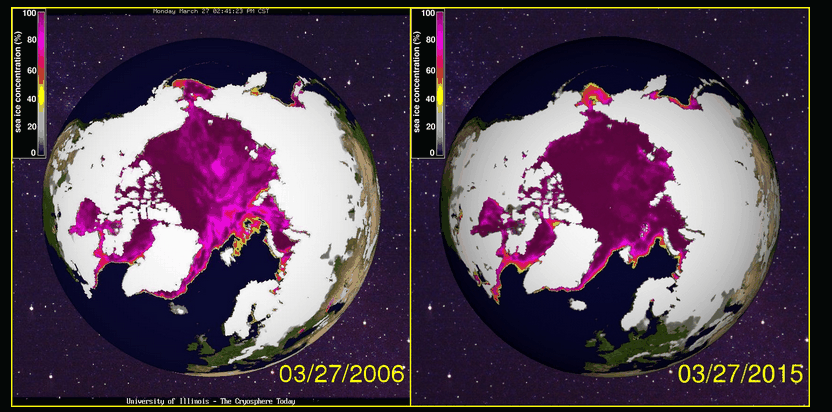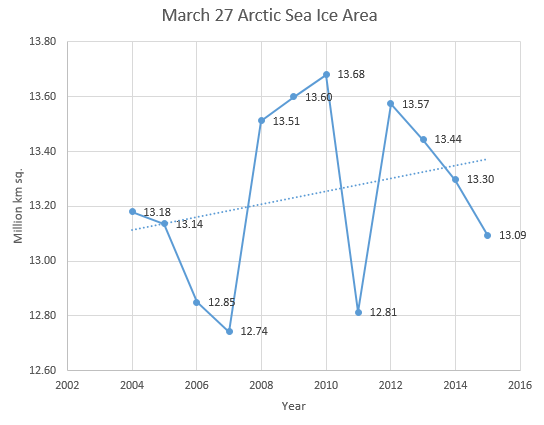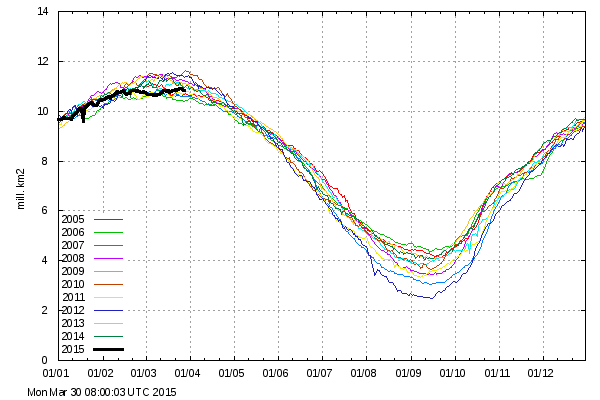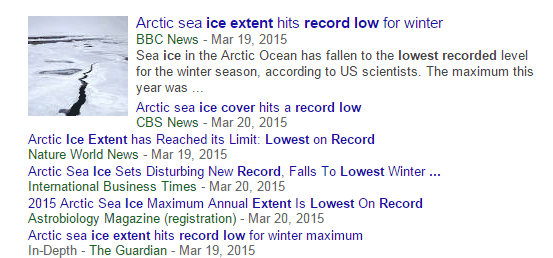NSIDC insists that Arctic ice is the lowest on record for winter, despite the fact that both area and extent are higher than several other years.
Satellite imagery shows that there is a lot more sea ice than 2006
The area of Arctic sea ice is considerably higher than 2006, 2007 and 2011
The extent of Arctic sea ice is higher than 2005, 2006, 2007 and 2011
Facts don’t matter to climate alarmists. All they need is one big lie from a government agency, and they will run with the story forever.






We are being fed blatant propaganda by “our” Government.
That is why NSIDC stands for No Science Inside the District of Criminals.
‘Not Spotting Ice Delivers Cash’
‘Not So It’s Damn Cold’
The Tree of Liberty needs feeding I’m afraid…
NY Times of course.
You can expect more hype and fantastic scare mongering as the “Paris Love In” draws near. The climate jihadis will not stop until their usefulness is no longer needed. Then I suspect they will be lined up against the nearest wall and dispatched in true communist fashion.
They have proven they are traitors and liars so why would any usurping totalitarian government allow them to continue to exist especially during the early days when a new regime is weakest. The Russian Intelligentsia found that out the hard way. Besides killing off the loud mouths who were FOR the regime change serves as an excellent warning to the Sheeple who might object.
Unfortunately the Useful Idiots including those in Academia never seem to learn this from history. All they see is the glittering Marxist Utopia with them in charge. They never look beneath the surface and figure out they have been Pwned!
Unlikely to get a wrongology apology out of Think Progress. As they say, “The fix is in.”
You do have to wonder about this whole three ring circus, it always comes back to a nice tight bundle in mid may. I mean that’s regardless of year on year variation, or el’noonar or whatever. So if any part of the cycle resets to a known state, that means no memory from year to year, therefore no long term accumulation of anything.
Clearly this year Ice thickness has increased considerably. Also the area of 100 percent concentration is far higher then 2006. I do not know how 2015 compares to 2006 as far as thickness, but clearly Arctic ice has both increased in area and thickness in the last two years.
I know one thing about thickness. Those that swallow the CAGW narrative are clearly “thick as a brick”
Apparently she really does work at NASA… she posted a graph from 18 March (12 days ago).
If the reason for the recent Arctic ice growth is north winds blowing south, then we could expect to see some fast melt in the coming months.
The ice is quite thick now. Blowing winds at such low T are not a large source of any melt. However winds can be a very large source of Ice moving south, leaving the arctic circle. The affect is much stronger later in the year when the ice is thinner.
Yeah, the winds are bringing the Arctic to where I live! Snowing today!!! It is COLD. Haven’t had a night above freezing so far this spring and it is now one day from April. This is insanely colder than normal.
On my way out to Uxbridge, MA last Thursday I stopped at the Flying J truck stop in Pembroke, NY (Just east of Buffalo). A mixture of rain, sleet, and snow was coming down hard as I fueled. Snow cover in MA is still pretty extensive.
NSIDC reports are from models, just like the other alarmist models which have a 100% failure rate in predictions. They are not meant to reflect reality, just ask the alarmists!
“The data doesn’t matter. We’re not basing our recommendations
on the data. We’re basing them on the climate models</b?.”
– Prof. Chris Folland, Hadley Centre for Climate Prediction and Research
“The models are convenient fictions</b?
that provide something very useful.”
– Dr David Frame, climate modeler, Oxford University
Part of this is climatologists having their own dataset.
Compared to operational ice charts, the passive microwave results underestimate ice extent, especially during the late summer minimum. The difficulty is mistaking surface melt water for open water, failing to discern the ice underneath.
“In summer, the difference between the two sources of data rises to a maximum of 23% peaking in early August, equivalent to ice coverage the size of Greenland.“
https://rclutz.wordpress.com/2015/03/30/everything-you-wanted-to-know-about-measuring-arctic-ice-but-were-afraid-to-ask/
Like I said, their reports are based upon alarmists models, so the alarmists decide what is and is not ice.
It doesn’t take a Walmart greeter to figure this out.
Maybe this is one more example of how we are trying to emulate Iran, are good friend and ally. 🙂 Just do what the state says or you will no longer be employed.
Notice DMI is changing its mask and hence changed the past so they may agree with the earlier date. But is there anyway to check the raw data that NSDIC processes so we can confirm that they haven’t lied with recent data so there are ‘right’?
You can’t just post today’s ice levels as a rebuttal to minimum maximum arctic sea ice levels. That is just crazy. The maximum this year occurred at the end of February. To be fair, (and maximums in reality mean very little), this year’s maximum is definitely lower than any other year’s maximum.
See this-
Wrong, they just thought it occurred in February. Loo at the post, or, for your convenience…
https://stevengoddard.files.wordpress.com/2015/03/icecover_current-31.png
Timo, yes DMI is working on a better reading of ice in watery zones, especially coastal areas. But there will always be an ingterpretive issue.
Climatologists say the NIC estimates are “conservative.” By this they mean NIC’s priority is shipping safety, and so, when in doubt, under mixed ice and water conditions, ice charts show ice. NIC people do not make predictions about sea ice, they only report what is there, according to their multiple sources.
On the other hand, principles at both NASA and NSDIC have said on the record that the Arctic will soon be ice-free, and it will be the fault of CO2. Is it possible that when in doubt, under mixed conditions, they report water in places where NIC shows ice? That would explain the discrepancies in estimates of ice extent.
Reblogged this on Globalcooler's Weblog.